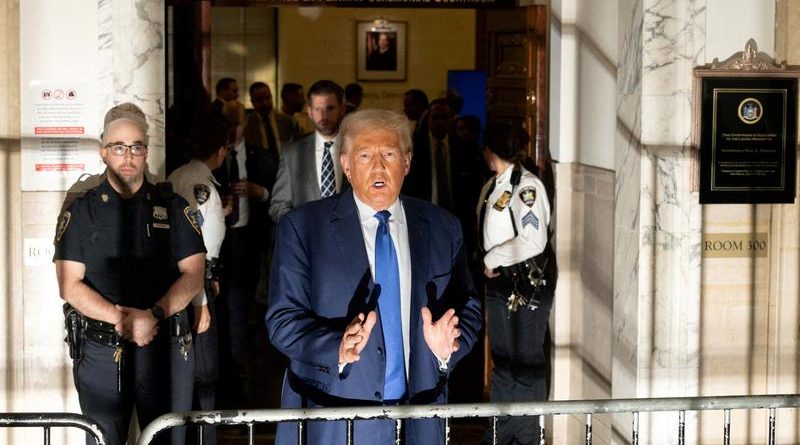Trump should be disqualified from 2024 ballot over Jan. 6 riot, advocates say at trial
(Reuters) – Donald Trump should be disqualified from Colorado’s ballot in next year’s election because he “incited a violent mob” in Washington on Jan. 6, 2021, an advocacy group lawyer argued at the opening of a trial on Monday.
A lawsuit brought by Citizens for Responsibility and Ethics in Washington is a test case for whether a rarely-used, Civil War-era provision of the U.S. Constitution that bars people who have engaged in “insurrection or rebellion” from holding federal office, can prevent Trump from being president again.
“Trump incited a violent mob to attack our Capitol, to stop the peaceful transition of power,” Eric Olson, an attorney representing voters and the advocacy group said in an opening statement of the one-week trial before a Colorado District Court judge.
Then-president Trump spent weeks before the Jan. 6 riot spreading false claims of widespread voter fraud in his November 2020 election loss to Democrat Joe Biden and encouraging his supporters to rally in Washington. He then encouraged them to march on the U.S. Capitol where Congress was certifying Biden’s win. Only after hours of violence did he appeal to the rioters to go home.
A lawyer for Trump, Scott Gesler, denied that Trump incited supporters to violence and said it would set a dangerous precedent to disqualify him based on “legal theories that have never been embraced by a state or federal court.”
“People should be able to run for office and shouldn’t be punished for their speech,” Gesler told the court during his opening statement.
Colorado is regarded as safely Democratic by nonpartisan election forecasters, so regardless of whether Trump is on the ballot, President Biden is expected to win the state.
Trump’s opponents are testing whether they have a viable path to keep him off ballots in individual states. Trump faces similar lawsuits brought by advocacy groups in Michigan and Minnesota. The Colorado case is the first to go to trial.
Danny Hodges, a Metropolitan Police Department officer who was injured during the attack, testified on Monday that the crowd at the Capitol reacted to Trump’s tweets in real time and grew increasingly violent.
Hodges said the crowd started “punching, kicking and pushing” him, then sprayed him with pepper spray and crushed him under a police shield.
Trump is the frontrunner for the Republican presidential nomination, according to opinion polls, in what is expected to be a rematch next year with Biden. Trump’s campaign has said the “absurd” lawsuit and others like it are “stretching the law beyond recognition.”
LONG-SHOT LEGAL STRATEGY
Trump’s opponents hope to deny him a path to victory by disqualifying him in enough hotly-contested states, but many legal experts call the strategy a long shot.
The cases raise largely untested legal questions, and even if the plaintiffs prevail, the final say would likely rest with a U.S. Supreme Court dominated by a 6-3 conservative majority that includes three Trump appointees.
The Colorado lawsuit seeks to bar the state’s top election official from putting Trump on the ballot under Section 3 of the 14th Amendment of the U.S. Constitution, which was established in the aftermath of the Civil War to prevent former Confederate rebels from taking federal office.
Colorado District Court Judge Sarah Wallace has denied five separate bids by Trump and his allies to dismiss the case, most recently on Oct. 25, when she rejected Trump’s arguments that courts do not have the power to determine eligibility for office.
Trump faces several legal cases as he campaigns for the presidency, including a New York state civil fraud lawsuit against his family company. That trial began on Oct. 2. He has pleaded not guilty to four criminal indictments, including federal cases tied to attempts to overturn the 2020 election results and the removal and mishandling of classified government documents when he left office in January 2021.
Source: Read Full Article

